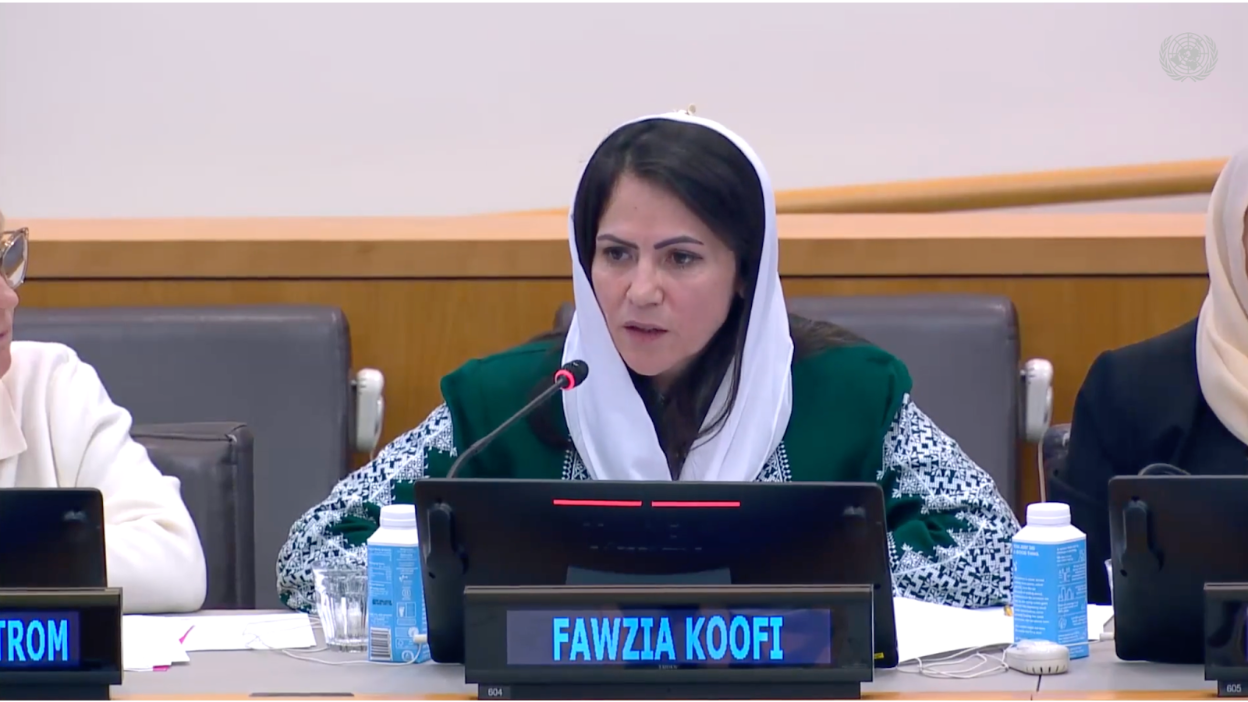
“A cat may feel the sun on her face. She may chase a squirrel into the park… A bird may sing in Kabul, but a girl may not, and a woman may not in public.” - Meryl Streep
The upcoming 30-year review of the Beijing Declaration and Platform for Action (BDPfA) has made the platform's 12 critical areas top of mind for Commission on the Status of Women (CSW) bureau members and feminists across the globe. During the 79th session of the United Nations General Assembly, member states and other stakeholders have come together to discuss the most pivotal topics impacting the world. The human rights situation in Afghanistan impacts many of the critical areas up for review during Beijing+30. In light of these direct violations of human rights, leaders are demanding support for Afghan women.
The UN included a high-level event on The Inclusion of Women in the Future of Afghanistan to further educate and mobilize global advocates and member states on the intensity of the suppression women experience in Afghanistan. The event showed a short excerpt of The Sharp Edge of Peace–a galvanizing documentary based on the efforts Afghan women have taken to regain their rights–and provided relevant discussion on the patent violation of freedom happening in Afghanistan.
Meryl Streep–a 3 time Academy Award-winning actress–joined leaders from around the world to speak about the reality of the impacts of the Taliban’s takeover. She underscores the freedoms women had before the restrictions were imposed and how women's employment and education
in Afghanistan was on the rise before being completely supressed by the regime.
Since the Taliban seized control of the Afghan government in 2021, there has been an extreme rollback of human rights, specifically targeted towards women and girls. Under the Taliban's government, women have strict dress codes, are confined to their homes, denied access to public spaces, may not speak loudly or sing, and have limited access to education, reproductive rights, and employment.

American Actress and Advocate, Meryl Streep
Just three years before the takeover, millions of girls were enrolled in primary and secondary education, while women's literacy rates had increased significantly. Women were seen in most traditional sectors of work and employment and held 27 seats in the Afghan parliament in 2020. Now, 75% of girls do not attend school and millions of girls are forbidden from accessing education past the 6th grade. Additionally, women have been barred from most positions of employment, including the country's leadership.
States and supporters continue to defy the Taliban’s restrictions, providing scholarships for Afghan women to continue their education, leveraging the national community's involvement, and calling on people to educate themselves on their country and its history. Still, there is much more to be done. Advocates and organizers are working tirelessly to demand reforms to education, healthcare, and employment, though they are often met with violence.
Leaders and international experts warn that the Taliban's policies will create an education system that will set a harmful standard for new generations, with the effect of bringing extremism to the entire region. This brings with it the threat of continual suppression of women for decades to come. Fawzia Koofi–an Afghan-Tajiki women’s rights activist–calls for UN member states to uphold the principles of the Convention on the Elimination of Discrimination Against Women CEDAW and demands the Security Council to unite around the issues of Afghanistan.

Lidy Nacpil from the Asian People's Movement on Debt and Development
“I think it is time for the world to let us have our own narrative, and stand by that and let that matter.” - Fawzia Koofi
During the event, ambassadors and advocates demanded that the International Community get involved in bringing about solutions to this crisis of women's rights. They noted that this is a human rights emergency, providing evidence of genocide against women in the state. They urged that nations around the world stand with the people of Afghanistan and hold the Taliban accountable for the irreversible damage it is causing to its people, including future generations.
With Beijing+30 around the corner, women hold the key to advocacy and the demands for liberation. Urging member state support and holding briefings to raise awareness are important, but demanding direct “humanitarian aid to women-led organizations” and looking back at policies to understand the mistakes made to allow this to happen may be key to uniting the Security Council around Afghanistan (Fawzia Koofi). To achieve the goals by 2030 in the Beijing Declaration and Platform for Action and continue to fight for gender equity, Afghan women must be liberated, and to liberate, we must demand action.

